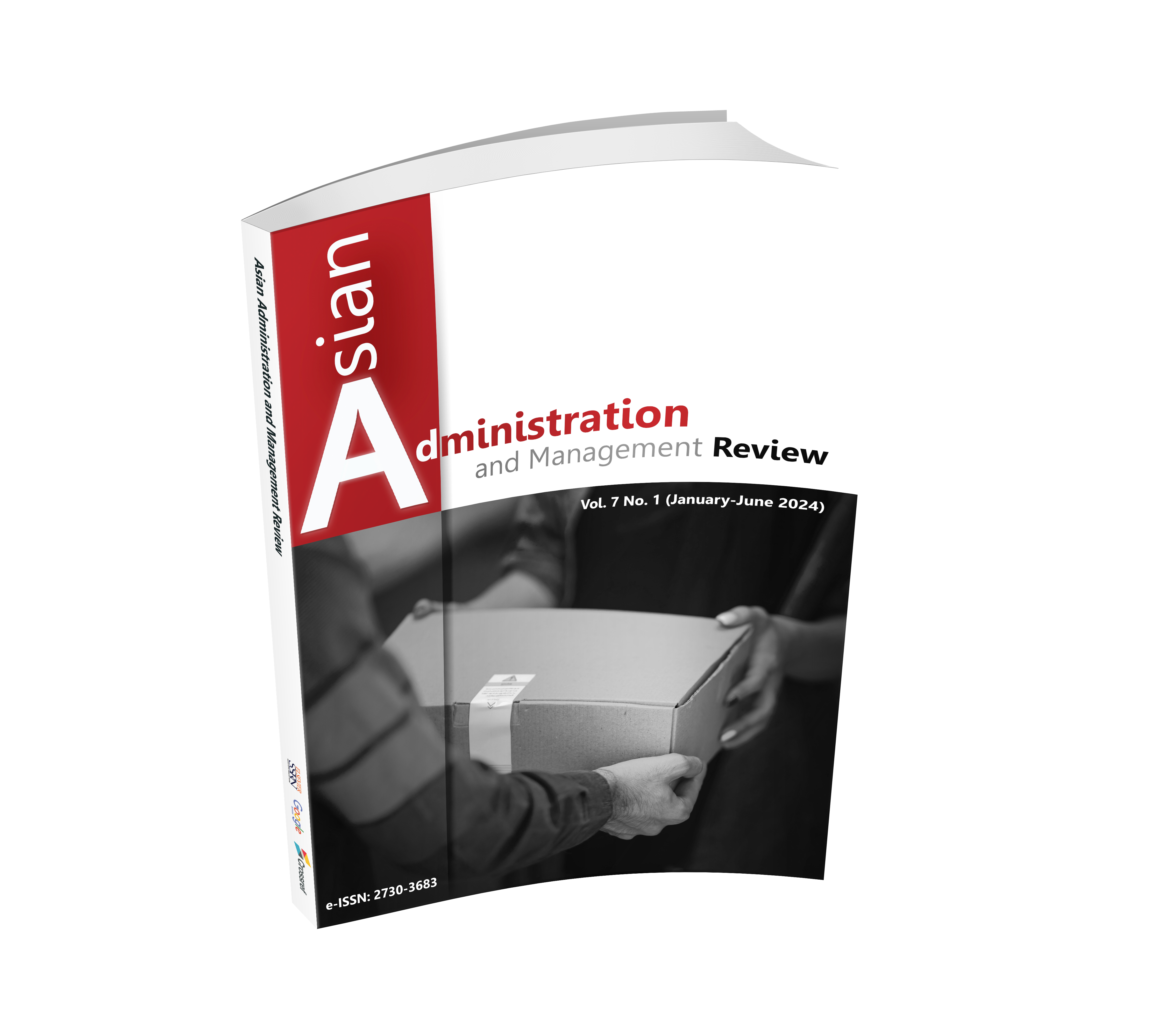IMPACT OF MANAGERIAL COMMUNICATION STYLE ON EMPLOYEES’ ATTITUDES AND BEHAVIOR: THE MEDIATING ROLE OF PSYCHOLOGICAL EMPOWERMENT
DOI:
https://doi.org/10.14456/aamr.2024.1Keywords:
Managerial Communication Style, Psychological Empowerment, Employees’ Attitudes and BehaviorAbstract
The study intends to identify the relationship between managerial communication style, psychological empowerment and employees’ attitudes and behavior. Additionally, the mediating role of psychological empowerment on the relationship between managerial communication style and employees’ attitudes and behavior. The data were gathered from 320 employees from manufacturing industries of Thailand using purposive sampling. The data were analyzed by using Analysis of Moment Structure and the Statistical Package for Social Science. Data analysis concluded a positive and significant relationship among managerial communication style, psychological empowerment and employees’ attitudes and behavior. And mediating role of psychological empowerment on the relationship between managerial communication style and employees’ attitudes and behavior also exist. This study's exploration of the deep impacts of managerial communication style on workers' attitudes and behaviors at work makes it significant. It provides a thorough understanding of the mechanisms by which communication promotes employee engagement and performance by analyzing the mediating role of psychological empowerment. These observations can help businesses make decisions about how to create an environment that is both productive and encouraging.
Downloads
References
Ambad, S., Kalimin, K., Ag Damit, D., & Andrew, J. (2021). The mediating effect of psychological empowerment on leadership styles and task performance of academic staff. Leadership & Organization Development Journal, 42(5), 763-782.
Awang, Z. (2012). A Handbook on SEM Structural Equation Modelling: SEM Using AMOS Graphic. 5th ed. Kelantan: Universiti Teknologi Mara Kelantan.
Bengtsson, N., Jost Auf Der Stroth, A., & Victor, P. (2020). (Could you please) send me the report, now (?)! The impact of managerial communication styles on employee engagement on ISM. Master’s Thesis, Linnéuniversitetet.
Bhandari, P., Sigdel, B., Photchanachan, S., Uppapong, K., & Bhattarai, A. (2023). Revamp of Tourism Industry in Nepal. Journal of Women's Entrepreneurship and Education, (1-2), 89-109.
Bhandari, P., Sigdel, B., Rungsuk, A., Chumlim, M., & Phiewla-or, A. (2022). Survival of the Women Entrepreneurs During Pandemic: The Mediating Role of Competitive Advantage on Entrepreneurial Orientation and Firm Performance in Nepal. The Journal of Pacific Institute of Management Science (Humanities and Social Science), 8(2), 223-235.
Dasgupta, S., Suar, D., & Singh, S. (2013). Impact of managerial communication styles on employees’ attitudes and behaviours. Employee Relations, 35(2), 173-199.
Gillet, N., Cougot, B., Moret, L., Tripodi, D., & Boudrias, J. (2023). Longitudinal psychological empowerment profiles, their determinants, and some health-related outcomes. European Journal of Work and Organizational Psychology, 32(3), 432-449.
Hair, J., Ringle, C., & Sarstedt, M. (2011). PLS-SEM: Indeed a silver bullet. Journal of Marketing theory and Practice, 19(2), 139-152.
Iqbal, Q., Ahmad, N., Nasim, A., & Khan, S. (2020). A moderated-mediation analysis of psychological empowerment: Sustainable leadership and sustainable performance. Journal of Cleaner Production, 262, 121429.
Jonsdottir, I., & Fridriksdottir, K. (2020). Active listening: Is it the forgotten dimension in managerial communication?. International Journal of Listening, 34(3), 178-188.
Khaleghinejad, A., & Ziaaldini, M. (2015). Relationship between employees' safety climate and safety performance with respect to mediating effect of safety knowledge and safety motivation in Sarcheshmeh copper complex. Journal of Health and Safety at Work, 5, 69-86.
Lee, Y., & Kim, J. (2021). Cultivating employee creativity through strategic internal communication: The role of leadership, symmetry, and feedback seeking behaviors. Public Relations Review, 47(1), 101998.
Lee, Y., & Kim, J. (2022). The impacts of CEO leadership behaviors on employees' affective commitment and scouting behavior: the mediating role of symmetrical internal communication. Leadership & organization development journal, 43(2), 261-278.
Liu, X., & Ren, X. (2022). Analysis of the Mediating Role of Psychological Empowerment between Perceived Leader Trust and Employee Work Performance. International Journal of Environmental Research and Public Health, 19(11), 6712.
Maran, T., Baldegger, U., & Klösel, K. (2022). Turning visions into results: unraveling the distinctive paths of leading with vision and autonomy to goal achievement. Leadership & Organization Development Journal, 43(1), 133-154.
Men, L., Yue, C., & Liu, Y. (2020). “Vision, passion, and care:” The impact of charismatic executive leadership communication on employee trust and support for organizational change. Public Relations Review, 46(3), 101927.
Mone, E., London, M., Mone, E., & London, M. (2018). Employee Engagement Through Effective Performance Management: A Practical Guide for Managers. 2nd ed. New York: Routledge.
Nugroho, B., Widdah, M., Hakim, L., Nashirudin, M., Nurlaeli, A., Purnomo, J., Aziz, M., Adinugraha, H., Sartika, M., Fikri, M., Mufid, A., Purwanto, A., & Fahlevi, M. (2020). Effect of Organizational Citizenship Behavior, Work Satisfaction and Organizational Commitment toward Indonesian School Performance. Systematic Reviews in Pharmacy, 11(9), 962-971.
Obrenovic, B., Du, J., Godinic, D., Tsoy, D., Khan, M., & Jakhongirov, I. (2020). Sustaining Enterprise Operations and Productivity during the COVID-19 Pandemic: “Enterprise Effectiveness and Sustainability Model”. Sustainability, 12(15), 5981.
Pongton, P., & Suntrayuth, S. (2019). Communication satisfaction, employee engagement, job satisfaction, and job performance in higher education institutions. ABAC Journal, 39(3), 90-110.
Ravenelle, A. (2019). “We’re not uber:” control, autonomy, and entrepreneurship in the gig economy. Journal of Managerial Psychology, 34(4), 269-285.
Schermuly, C., Koch, J., Creon, L., Drazic, I., & Graßmann, C. (2023). Developing and Testing an Instrument to Measure the Culture for Psychological Empowerment in Organizations (IMPEC). European Journal of Psychological Assessment, 39(5), 354-370.
Sigdel, B., & Amponstira, F. (2021). A model of corporate social responsibility, firm reputation, and firm performance in small and medium enterprises in Kaski, Lamjung, and Gorkha District of Gandaki Province, Nepal. Open Journal of Business and Management, 9(5), 2248-2260.
Siyal, S., Liu, J., Ma, L., Kumari, K., Saeed, M., Xin, C., & Hussain, S. (2023). Does inclusive leadership influence task performance of hospitality industry employees? Role of psychological empowerment and trust in leader. Heliyon, 9(5), e15507.
Stanescu, D., Zbuchea, A., & Pinzaru, F. (2021). Transformational leadership and innovative work behaviour: the mediating role of psychological empowerment. Kybernetes, 50(5), 1041-1057.
Ugwu, F., Onyishi, I., & Rodríguez-Sánchez, A. (2014). Linking organizational trust with employee engagement: The role of psychological empowerment. Personnel Review, 43(3), 377-400.
Yu, S., Abbas, J., Draghici, A., Negulescu, O., & Ain, N. (2022). Social media application as a new paradigm for business communication: the role of COVID-19 knowledge, social distancing, and preventive attitudes. Frontiers in Psychology, 13, 903082.

Downloads
Published
How to Cite
Issue
Section
License
Copyright (c) 2023 Authors

This work is licensed under a Creative Commons Attribution-NonCommercial-NoDerivatives 4.0 International License.











.png)


